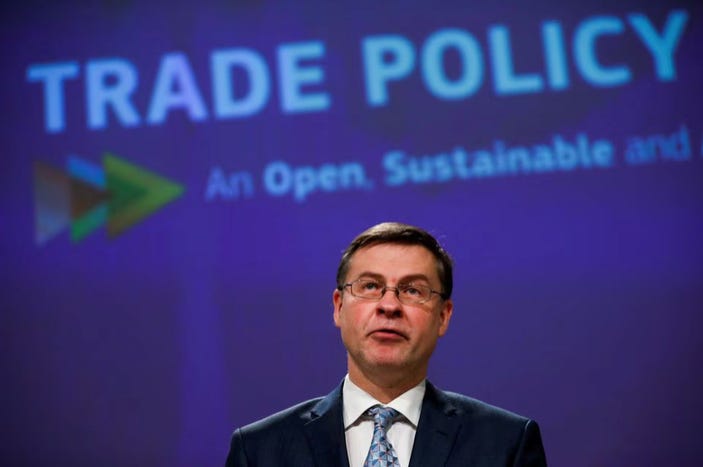NATO Chief Warns Ukraine War a Threat to US in Asia
If Putin wins in Ukraine, China’s Xi would be encouraged to take Taiwan: Stoltenberg.
NATO Secretary General Jens Stoltenberg warned the consequences of a defeat for Ukraine in its war with Russia would increase security risks for the United States in Asia.
“It would be a tragedy for Ukraine if President Putin wins, but it will also be extremely dangerous for us,” Stoltenberg said in remarks to a Council on Foreign Relations event on the sidelines of the United Nations General Assembly in New York on Thursday.
“It would make the world more dangerous and us more vulnerable, because then the message to President Putin but also to President Xi is that when they use military force, when they violate international law, when they invade another country, they get what they want,” Stoltenberg said.
Stoltenberg said his agenda in New York this week has been to advocate for Western military and financial aid to Ukraine in its 21-month war against Russia’s invasion.

“If the United States is concerned about China and wants to pivot towards Asia, then you have to ensure that Putin doesn’t win in Ukraine,” he said. “That will make it easier for you to focus also on China and not only or be less concerned about the situation in Europe. And opposite if Putin wins. It is in the security interest of the United States to ensure that Ukraine wins and make it easier to deal with China.”
Over the past year, China’s People’s Liberation Army forces have been probing Taiwan’s air defense zone and conducting naval exercises simulating an amphibious invasion and blockade of the island nation. Taiwan’s Defense Ministry said more than 100 PLA warplanes had approached its airspace on Sunday and Monday.
China’s President Xi Jinping has directed the PLA to be prepared to take Taiwan by force in 2027.
NATO Opening in Japan
NATO is opening a liaison office in Japan. The office will enable security discussions with Japan, South Korea, Australia and New Zealand in light of geopolitical challenges from China.
“We realize that security is not regional security. It’s global,” Stoltenberg said. “This idea that we can have European or transatlantic security regardless what happens in Asia is just wrong, for many reasons not least because we see that Beijing and Moscow are coming more and more closer together.”
“Just two weeks before the invasion, China and Russia signed this agreement stating that their partnership is without any limits. We see how Russia and China are conducting more air and naval patrols together, exercises, and how they support each other diplomatically, politically, and many other ways. And the reality is that China is propping up Russia’s war efforts by—or, supporting the war efforts by propping up the economy, and also by spreading the false narrative—the Russian false narrative of what this war is about,” Stoltenberg said.
“What happens in Europe matters for Asia, and what happens in Asia matters for Europe. That’s also a reason why countries like South Korea and Japan are extremely concerned about the war in Ukraine. Because they know that if President Putin wins, it lowers the threshold for President Xi to use force,” he said.
Ukraine President Volodymyr Zelensky was in Washington, DC, on Thursday for meetings with President Joe Biden and members of Congress. Biden has reportedly declined to provide Ukraine with ATACMS, long-range missiles that could be used to strike targets deep inside Russia.
Meanwhile, Republicans in the House of Representatives have been unable to agree on $24 billion in funding for Ukraine that Biden has requested. Former President Donald Trump and his allies in Congress have expressed opposition to continuing US aide for Ukraine.
Beijing Blocks Gallium Exports
China stopped exporting two minerals needed for making semiconductors and electric vehicles in August, according to the latest Chinese customs data reported by CNN.
Until last month China had supplied about 60 percent of the world’s germanium and 80 percent of gallium, according to the Critical Raw Materials Alliance based in Brussels.
Beijing imposed export controls on the two critical minerals in in apparent retaliation of US restrictions on sales of advanced semiconductor technology to China.
Gallium has unusual crystallization properties making it useful in the manufacture of light-emitting diodes (LEDs) and in industrial magnets used in electric motors. Germanium is highly conductive of electricity and is widely used in fiber optics, infrared optics, and solar cells. Both are important for semiconductor manufacturing.
China’s controls on exports of gallium and germanium have prompted mining companies and Western buyers to begin looking for sources elsewhere. China exported 5.15 metric tons of forged gallium and 8.1 metric tons of forged germanium in July, according to CNN.
A US Department of Energy study published in July identified supply of gallium as critical to the development of a clean energy economy.
EU trade chief in Beijing
European Union Trade Commissioner Valdis Dombrovskis is in Beijing to push for fewer restrictions on European businesses even as the EU weighs whether to impose punitive tariffs on Chinese electric cars.
Dombrovskis will take part in a joint EU-China economic and trade dialogue in Shanghai and Beijing from September 23 to 26. He is expected to meet European business executives in China and deliver two speeches during the trip, according to Reuters.
European leaders are wary of Beijing's closer ties with Moscow and have been working to keep China from engaging in Russia's war in Ukraine by maintaining open trade ties.
Dombrovskis is arriving in China just a week after the EU launched a probe of China’s electric vehicle subsidies. The probe is a step toward punitive tariffs to protect European producers against cheaper Chinese electric vehicle imports.
“Global markets are now flooded with cheaper electric cars. And their price is kept artificially low by huge state subsidies," European Commission President Ursula von der Leyen said.
- William Roberts






Thanks. You deserve tonnes of readers.